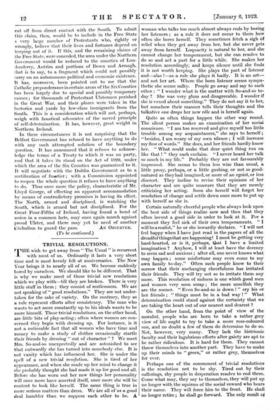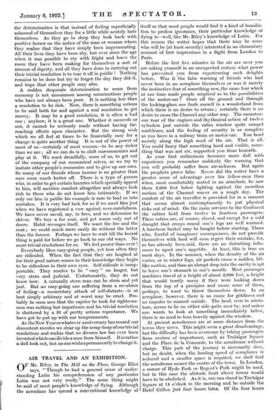TRIVIAL RESOLUTIONS. T HE wish to get away from " The
Usual " is recurrent with most of us. Ordinarily it lasts a very short time and is most keenly felt at anniversaries. The New Year brings it to nearly all of us. We become suddenly bored by ourselves. We should like to be different. That is why we make most of those trivial new resolutions which we play with—till they are broken. There is very little stuff in them ; they consist of restlessness. We are not speaking of " good resolutions." They are not under- taken for the sake of variety. On the contrary, they as a rule represent efforts after consistency. The man who wants to act more constantly up to his ideals wants to be more himself. These trivial resolutions, on the other hand, are little bits of play-acting; often where women are con- cerned they begin with dressing up. For instance, is it not a noticeable fact that all women who have time and money to make a study of clothes occasionally startle their friends by dressing " out of character " ? We meet Mrs. So-and-so unexpectedly and are astonished to see that outwardly she has turned into somebody else. It is not vanity which has influenced her. She is under the spell of a new trivial resolution. She is tired of her appearance, and when she made up her mind to change it she probably thought she had made it up for good and all. Before she has worn out her new things her personality will once more have asserted itself, once more she will be content to look like herself. The same thing is true in more serious matters than dress. We are all of us a good deal humbler than we suppose each other to be. A woman who talks too much almost always ends by boring her listeners ; as a rule it does not occur to them how often she bores herself. They sometimes fetch a sigh Of relief when they get away from her, but she never gets away from herself. Loquacity is natural to her, and she cannot change her temperament, but she can resolve to do so and act a part for a little while. She makes her resolution accordingly, and keeps silence until she finds it is not worth keeping. She plays the part of listener and—alas !—as a rule she plays it badly. It is an art-- and not her art. Where the born listener seems sympa- thetic she seems sulky. People go away and say to each other : " I wonder what is the matter with So-and-so to- day ? She was very glum and disagreeable. I wonder if she is vexed about something." They do not say it to her, but somehow their manner tells their thoughts and the talkative one drops her new role and is herself again.
Quite as often things happen the other way round. The silent person makes an examination of her social conscience. " I am too reserved and give myself too little trouble among my acquaintances," she says to herself ; " besides, I am weary of my own -silence ; I will increase my flow of words." She does, and her friends hardly know her. " What could make that dear quiet thing run on like that ! " they each exclaim. " I never heard her talk so much in my life." Probably they are not favourably impressed. She seems to them less wise than usual, a little prosy, perhaps, or a little gushing, or not so good- natured as they had imagined, or more of an egoist, or less discreet. They incline to revise their opinions of her character and are quite unaware that they are merely criticizing her acting. Soon she herself will forget her resolution of change and settle down once more to put up with herself as she is.
Certain naturally cheerful people who always look upon the best side of things realize now and then that they often invent a good side in order to look at it. For a moment they feel sick of their own temperaments. " I will bea realist," he or she inwardly declares. " I will not feel happy when I have just read in the papers of all the dreadful thingsthat are happening! I must be getting very hard-hearted, or is it, perhaps, that I have a limited imagination ? Anyhow, I will at least have the decency to seem sad and anxious ; after all, one never knows what may happen ; some misfortune may even come to my own family to-day." Often such people know to their sorrow that their unchanging cheerfulness has irritated their friends. They will try not so to irritate them any more. This resolution of sadness is one which good men and women very soon scrap ; the more unselfish they are the sooner. " Even So-and-so is down ! " cry his or her friends ; " things must be in a bad way ! " What determination could stand against the certainty that we are taking the heart out of our nearest and dearest ?
On the other hand, from the point of view of the moralist, people who are born to take a rather grey view of life ought to try to take a more rose-coloured one, and no doubt a few of them do determine to do so. Not, however, very many. They lack the histrionic faculty and their lugubrious efforts after gaiety are apt to be rather ridiculous. It is hard for them. They cannot throw themselves into another part. They have to make up their minds to " green," or rather grey, themselves for ever.
Perhaps one of the commonest of trivial resolutions is the resolution not to be shy. Tired out by their sufferings, shy people in desperation resolve to end them. Come what may, they say to themselves, they will put up no longer with the squirms of the social coward who bears their name. They will force him to the front. He shall, no longer retire ; he shall go forward. The only result of the .determination is that instead of feeling superficially ashamed of themselves they for a little while acutely hate themselves. As they go to sleep they look back with positive horror on the antics of the man or woman whom they realize that they have simply been impersonating. All their lives they have been shy, but ever since the age when it was possible to cry with fright and leave the room they have been making for themselves a sort of armour of dignity, and all they have done in carrying out their trivial resolution is to tear it off in public I Nothing remains to be done but try to forget the day they did it, and hope that other people may also.
A sudden desperate determination to cease from economy is not uncommon among conscientious people who have not always been poor. It is nothing less than a resolution to be rich. Now, there is something serious to be said both for and against a real resolution to get money. It may be a good resolution, it is often a bad one ; anyhow, it is a great one. Whether it succeeds or not, it cannot be seriously made without having far- reaching effects upon character. But the strong wish which we all feel at times to be financially easy for a change is quite another thing. It is out of the power of most of us—certainly of most women—to be any richer than we are ; all we can do is to shift our economies and play at it. We want dreadfully, some of us, to get out of the company of our economical selves, so we try to imitate other people's economies and to give up our own. So many of our friends whose income is no greater than ours seem much better off. There is a type of person who, in order to get certain luxuries which specially appeal to him, will sacrifice comfort altogether and always look rich to those who do not know him intimately. If we only see him in public his example is sure to lead us into mistakes. It is very bad luck for us if we meet him just when we have registered a vow against over-carefulness. We have never saved, say, in fires, and we determine to shiver. We buy a fur coat, and get warm only out of doors. Habit revenges itself. We want the fire and the coat ; we could much more easily do without the latter than the former. Perhaps we have to wait till the horrid thing is paid for before we go back to our old ways. No more trivial resolutions for us. We feel poorer than ever ! Everybody likes easy-going people, yet how often they are ridiculed. When the fact that they are laughed at for their good nature comes to their knowledge they begin to be ridiculous in their own eyes. Self-ridicule is insup- portable. They resolve to be " easy " no longer, but very stern and judicial. Unfortunately, they do not know how. A naturally stem man can be stem and yet just. But an easy-going one suffering from a revulsion of feeling—a momentary attack of self-distaste-4s at best simply arbitrary and at worst may be cruel. Pro- bably he soon sees that the caprice he took for righteous- ness was nothing but impatience and his trivial resolution is shattered by a fit of pretty serious repentance. We have got to put up with our temperaments.
As the New Year or whatever anniversary has roused our discontent recedes we clear up the scrap-heap of our trivial resolutions and realize that no divorce law has ever been invented which can divide a man from himself. It is rather a dull look out, but no one wishes permanently to change it.



















































 Previous page
Previous page